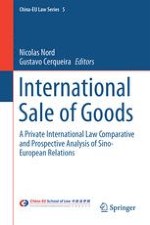2017 | Buch
International Sale of Goods
A Private International Law Comparative and Prospective Analysis of Sino-European Relations
herausgegeben von: Nicolas Nord, Gustavo Cerqueira
Verlag: Springer International Publishing
Buchreihe : China-EU Law Series
